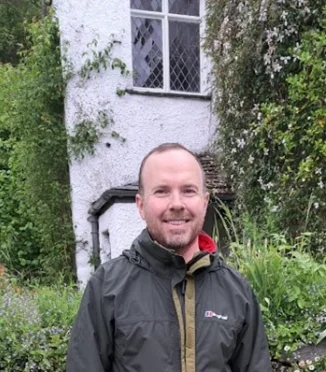A place to feel truly
heard and understood
Welcome to Ormskirk Therapy
A confidential, non-judgemental space to help you explore the thoughts, feelings and challenges in your life. A place to feel truly heard and understood.
Hi, and thank you for visiting Ormskirk Therapy. My name is Andy Crossley and I am an experienced counsellor and psychotherapist providing both short- and long-term therapy to young people and adults in Ormskirk and the surrounding areas of West Lancashire, Merseyside and Sefton. As well as face-to-face sessions, I offer online and telephone counselling.
Are you looking for greater understanding of yourself and the experiences you have faced?
Do you want to make meaningful change in your life?
From personal experience, I know how difficult life can be at times and how challenging it is to cope with our thoughts, feelings and emotions. It can be difficult to talk to our family and friends about our problems; it is often easier to speak to someone who is not emotionally involved in our lives. At Ormskirk Therapy, I offer a warm, non-judgemental space where you will be listened to and actively heard.

My therapy practice uses the person-centred approach that views you as the unique expert in your own life. Working together, we can help you explore and have a greater understanding of yourself, the experiences, and issues you have faced. You will be able to express yourself freely in a safe therapeutic environment. Through the empathy and support received, you can gain greater self-acceptance to make meaningful change and discover your true authentic self.
What issues can counselling help with?
You may be struggling with bereavement, grief and loss or struggling with issues around your identity. Anxiety and depression could be holding you back from getting on with life. Coping with unresolved feelings of anger or suicidal thoughts can seem impossible.
I specialise in men's mental health, and chronic illness or disability.
I work with a wide range of clients and can help with a whole range of issues, but I have a personal interest or unique experience in the following specific areas:
Chronic ill-health and disability
Anxiety and depression
Suicidal ideation
Identity and purpose
Work-related stress
Relationship issues
Adverse childhood experiences
Bereavement, grief and loss
Anger issues
Trauma
Positive change and personal growth
Men’s mental health
About Me
I trained for several years up to and including a Postgraduate Diploma (Level 7) in Counselling and Psychotherapy Practice, as well as a Master's Degree in Counselling and Psychotherapy.
I am an Accredited Registrant (MNCPS Acc.) of the NCPS (National Counselling and Psychotherapy Society).
I have particular interest in the impact on mental health because of ill-health. This is a result of personal experience of living with a chronic health condition. Coming to terms with, accepting and subsequently living with ill-health was a challenge and had a significant impact on my mental wellbeing.

Fortunately, I sought the help and support of a therapist. From personal experience, I fully understand the benefit counselling can bring in helping people get through dark times. Therapy helped me gain self-acceptance and supported me to make positive changes and achieve personal growth in my life.
Alongside my work in private practice, I have worked with several organisations and charities offering mental health support to people in the local area. This includes a charity specifically focused on improving the lives of men and increasing men's access to counselling. As a once reluctant client myself, I am passionate about breaking down the stigma and barriers men may experience around mental health.

Frequently Asked Questions
Some therapists tend to view counselling as ‘short-term’ work; when someone has a problem that can be looked at and discussed in a clearly resolvable way. This work often requires undertaking sessions for a certain number of weeks, to explore, discover and clarify a way forward. Psychotherapy is a word often used to describe ‘long-term’ work; discussion that tends towards substantial issues and things that might be life-changing on a deeper level. Whether counselling or psychotherapy work best as a short- or long-term option depends on the client though, and the difficulties they are facing. In some cases, counselling can prove helpful as a continuing, longer-term option, or psychotherapy can help resolve an issue in just a few sessions.
There’s no fixed or ideal length of time for the therapy process; it varies from person to person and will often depend on the depth of the issues they are facing. While I can work on an open-ended basis with clients, I find it is helpful for us to both agree before we start on undertaking a certain number of sessions and reviewing where we are at once we reach that point. You can decide how long your therapy will last, and in return my aim is to make sure therapy continues for only as long as it is of benefit to you. This depends on what your needs are. Some people find that after only a few sessions they have some clarity and focus and are ready to end the therapy. Other people value the ongoing support and relationship with me and will continue to attend for weeks, months, or even years. There is no ‘one-size-fits-all’ when it comes to therapy, and I offer a flexible approach.
My aim is to offer you a first appointment within 1-2 weeks. However, waiting times will vary according to availability.
Confidentiality is one of the main ways in which therapy differs from many other forms of helping – for example, talking to friends or family can rarely offer the same degree of confidentiality as talking to a therapist. Because of this confidentiality, you will find that – as you get used to coming for therapy – you are freer to talk about whatever you wish to. No counsellor can offer 100% confidentiality: there are some situations where the law requires disclosure of risk (e.g., certain child protection issues) and in common with most other therapists, there are some situations where I may not be able to keep total confidentiality. In particular, if someone tells me that they are thinking of harming themselves in a way that I believe puts them at serious risk, or if someone tells me that they are doing something that could put others at risk, I may not be able to keep such information confidential. However, breaking confidentiality is rare, and only happens after talking to the person concerned.
When you come for therapy it’s important that you feel free to talk about whatever is important to you. Having a friend or family member with you is not usually helpful because of the personal relationship you have. Even if they are supportive, or want you to ‘get better’, this can prevent us from exploring issues. Sometimes, family/friends can even be part of an underlying issue which needs to be aired and discussed. Usually, people who ask this question are nervous about coming for a session alone, or they are anxious for the person who is thinking about arranging sessions. This anxiety is quite normal, and you will not be forced to talk about anything you feel uncomfortable about – but you do need to be able to talk about whatever is important. For this reason, I do not see clients accompanied by friends or family.
Location
Face-to-face therapy sessions take place in a hired, purpose-built summerhouse therapy room in Ormskirk; this is a lovely relaxing environment that is ideal to help you get the most out of our sessions. The therapy room is easily accessible from the surrounding areas such as West Lancashire, Merseyside and Sefton.
I also offer online and telephone counselling if that suits you better.
Fees
Session rate (1 hour) = £60
Block booking of 6 sessions available for £300 (saving £60).
I accept payment by bank transfer.
I offer complete flexibility in terms of frequency of appointments. Like most therapists, I am happy to offer regular weekly sessions, but I also understand that a more flexible approach may be needed by some clients.
If you are interested in booking a therapy session, please email me to enquire about availability.
Note that for booked sessions, I require 48 hours’ notice if you want to cancel an appointment. Otherwise, you will still need to pay for any sessions missed.
Get in touch
Feel free to contact me if you have any questions about how counselling works, or to arrange an initial assessment appointment.
This enables us to discuss the reasons you are thinking of coming to counselling, whether it could be helpful for you and whether I am the right therapist to help.
You can also call me on 07763451121 if you would prefer to leave a message or speak to me first.
© Ormskirk Therapy
powered by WebHealer